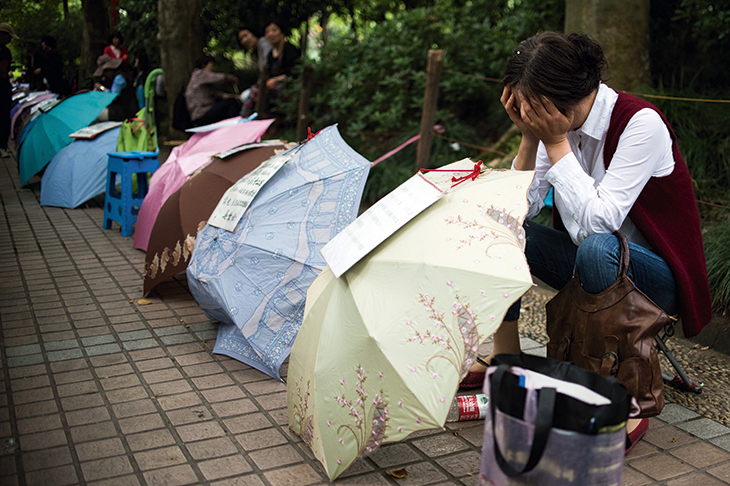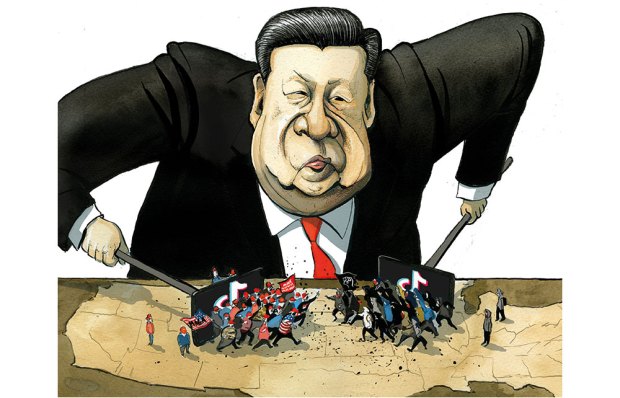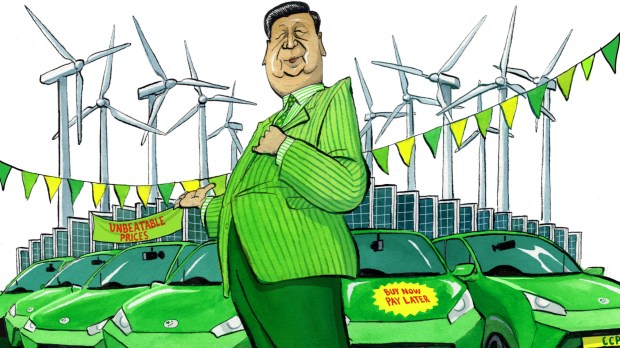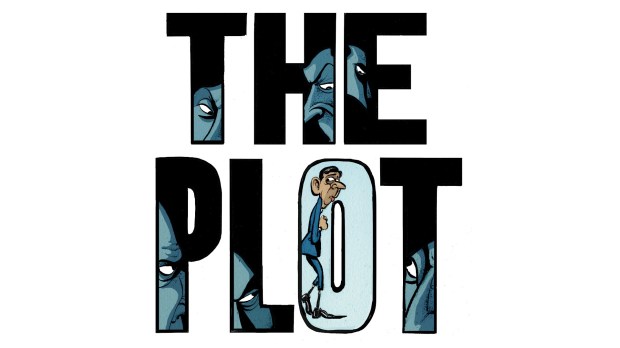Shanghai
‘How old are you, young lady?’ A small, curious crowd starts to surround me. ‘How tall are you? What do you work as?’ The parents camping out in Shanghai’s infamous marriage market have no time for small talk. They come here every weekend, rain or shine, seeking a partner for their grown-up son or daughter. Age, wage, height, education — everyone has a wish list, and they also condense their own child into such a list. Today’s special: me.
The so-called Matchmakers’ Corner has seen tens of thousands of Chinese parents, including members of my own family, come to investigate what (or who) is out there. A great many parents worry about their child’s stubborn singledom. In Britain, parents might fret; perhaps say a prayer or two. Here, in Shanghai’s People’s Park, they make posters and advertise. Then they sit and wait.
As I walk up to the camp, I’m struck by how prepared they all are. They sit like fishermen, with collapsible stools and Thermos flasks to keep them going for an eight-hour shift. This is not their first rodeo. Each child is advertised with the aid of a colourful umbrella, lying open on its side and a sheet of A4 containing the all-important dating profile. The first one I read shows the standard template.
‘Only child, female, born June 1986, height 1.69 metres,’ it says. ‘Bachelor’s degree, house-owning, stable job as a doctor, income 10,000 yuan per month, enjoys playing the piano (passed grade eight), an amiable personality, both parents now retired (formerly employed at Sinopec). Seeking a responsible and kind boy who works in Shanghai, holds at least a bachelor’s degree and is taller than 1.75 metres.’
The parents of this 32-year-old woman have obviously started to get worried. But her circumstances are good. She has property — a big plus. Her salary is so-so by Shanghai standards but the fact that the parents were at Sinopec, the state-owned oil company, suggests the family is respectable. And the education is crucial: these are parents of graduates, looking for graduates.
I have a go. My downsides: I own neither a car nor a house — and, on a journalist’s salary, I’m not sure when I’ll acquire either. On the other hand, I’m educated (abroad, no less, which impresses the Chinese), young (24), and reasonably tall (well, 5ft 5in but this is China). I cheerfully list my pros and cons to the mums and dads around me, as keen wrinkled eyes size me up. I’m about a decade younger than they’re used to, and some tell me this and walk away.
For those who are getting more serious, I stress apologetically that I am there looking for a story, not for a man. ‘Don’t worry, give me your number anyway,’ said one mum, ‘in case you have any friends, or change your mind.’
They come as early as six in the morning, and spend their days gossiping with each other and making fast friends, hoping that today’s the day. ‘Normally there are hundreds of us,’ one father tells me. But he could have passed for a grandfather — many people here are in their sixties and seventies. There’s an ‘old Shanghai’ corner for the highborn, who judge social class by how many generations of a family have lived in the city. Then an ‘overseas corner’ with the details of people like me who have emigrated. These adverts are laid on park steps, with a flag indicating each destination country.
I see only one advert that specifies looks: from a man in his forties who wants a woman with ‘naturally big eyes’ — a reference to a cosmetic surgery popular in East Asia. It adds a fold in the eyelid, making the eye seem larger. But men who want big-eyed children are wary of this. This man is one of the few to include a picture of himself, but with his complicated dating history and fussy wish list for his future bride, his sharp suit makes little difference.
I notice one elderly man looking after about 20 adverts for other parents who couldn’t make it that day. I decide to ask him, directly, why he doesn’t leave his daughter to find love herself. ‘She says she’s looking, but obviously not hard enough. She’s just not as anxious as we are,’ he sighs. He tells me that she studied in Australia and stayed there after graduation. She’s now 39, and a government accountant. I imagine her chilling with friends in a Sydney bar while her father spends cold weekends camped in a park.
China is changing at a speed that disorientates the older generation. My grandma’s brick hut, where I spent childhood summers, has been demolished, like millions of others, as cities gobble up nearby villages and skyscrapers go up in their stead. The surge in wealth has been extraordinary and the country I left behind now looks (and acts) a lot more like the one I moved to.
The people have changed too. With their financial circumstances better than ever, the thirtysomethings on offer at Matchmakers’ Corner have never wanted for much. They have more to focus on than just marriage and children. This is particularly true for young women, whose lives are now defined by academic success and high-flying careers.
With such busy, interesting lives, when are you supposed to partner up and get married? In the past five years, weddings in China have fallen by a third. Our lives are no longer marked by the few clear milestones of marriage, childbirth, death. Those who do tie the knot do so later in life, with the average marriage age steadily increasing.
In 2000, the national average age for getting married was 24. These days it’s 28. (And in Shanghai, as in other wealthier parts of the country, the figure is even higher: the city’s average marriage age is 33.) Lifting the one-child policy hasn’t turned around the birth rate, which fell by nearly 12 per cent between 2017 and 2018 — or two million fewer babies. The divorce rate, on the other hand, has doubled since 2006, to 3 per cent. The Confucian family unit is disintegrating.
For the older generation, this feels like a disaster, and one of their own making. Who knew that the education, piano classes and trips to the cinema that made their children’s childhoods so much better than their own would also create different values? These elderly parents grew up in the villages destroyed by China’s urban explosion. For them, a partner and children were essential for survival, helping with chores and looking after you in old age. China’s pensioners have tasted the bitter pill of absolute poverty and they’re here in Shanghai in all weathers because they will do anything to make sure their children are provided for.
But the importance of marriage comes from more than cold economic calculation. It goes without saying that procreation is a must — and passing down the family name has become only more pressing as the 1980 one child policy pins a family’s hopes on one offspring. Most of the singles at the marriage market were born after 1980, making their parents the first generation of Chinese to be subjected to it. There’s no instruction manual for what to do when your only child can’t pass down the family name.
I was also struck by the explanation given by my aunt, who visited a marriage market in desperation for her late-marrying daughter. Being a woman, lineage was less important — children take their father’s name anyway. Instead, she needed to complete her parental duties. My aunt still saw my cousin, 28 at the time, as a child, and would do so until she got married. In Britain, adulthood comes at 18. But in China, many youngsters still live under their parents’ roofs until they make their own homes. For my aunt, marriage was the moment her responsibilities as a mother were at last completed. Her daughter was finally brought up.
The Chinese press sometimes unkindly calls them ‘people peddlers’, but this is unfair. These people are here in the cold while other families reunite for Chinese New Year, not because they want riches or a nice house for their offspring, but because they want them to be happy. And for them, as for every Chinese generation before them, happiness means a good partner.
I arrived in Matchmakers’ Corner expecting to see what happens when tiger mums turn their sights from education to marriage. I left feeling sad for the parents who go to such extraordinary lengths with so few expectations. The father whose daughter is in Sydney admits to me that, for all the occasional tales of success, he knows that his own chances of finding Mr Right for her are pretty slim. ‘But,’ he asks me, ‘what else can I do?’
Got something to add? Join the discussion and comment below.
Get 10 issues for just $10
Subscribe to The Spectator Australia today for the next 10 magazine issues, plus full online access, for just $10.
You might disagree with half of it, but you’ll enjoy reading all of it. Try your first month for free, then just $2 a week for the remainder of your first year.















Comments
Don't miss out
Join the conversation with other Spectator Australia readers. Subscribe to leave a comment.
SUBSCRIBEAlready a subscriber? Log in